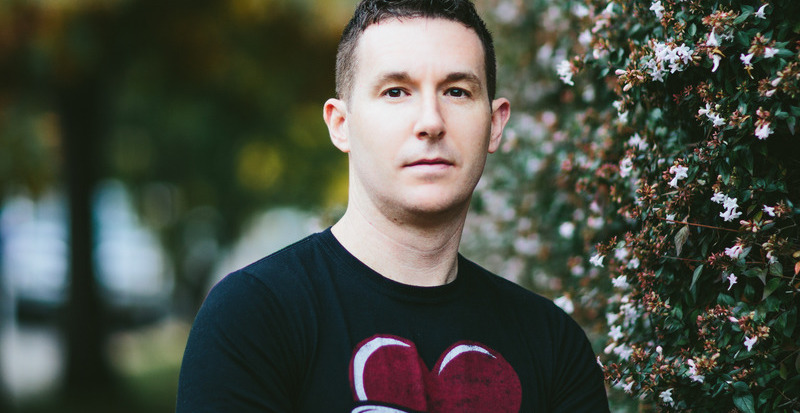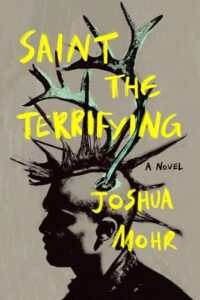
Joshua Mohr on Writing a Genre-Blending Post-Modern Punk Rock Saga
Jane Ciabattari Talks to the Author of “Saint the Terrifying”
Since 2009, when his first novel Some Things That Meant the World to Me introduced his heart-rending, beat-driven, often surreal voice, Joshua Mohr has published nine books—two raw addiction memoirs (Sirens and Model Citizen) and seven idiosyncratic novels. The New York Times called his 2011 novel Damascus, set in a dive bar in San Francisco’s Mission district, “Beat-poet cool.”
His 2023 novel Farsickness, about an Afghan war veteran whose inner voice begins to call him “home” to a castle in Scotland—the concept comes from the word Fernweh, meaning to be homesick for a place you’ve never been—was illustrated by his daughter Ava, who was nine at the time. Mohr’s new novel, Saint the Terrifying, is first of a trilogy that will be released within the year. Saint launches tonight at Litquake in San Francisco, with Slummy, Saint’s punk-rock band, performing tracks from their limited edition blue vinyl album.
“Yeah, the record label is releasing vinyl with the first book,” Mohr says.
It’s on all the digital platforms, too, of course, but the vinyl is what I’m most excited about. Writing Saint’s music was so much fun. Truthfully, Jane, I never expected anybody but me to hear the music! I only wrote the songs as a form of character exploration: I needed to know what Saint’s band, Slummy, sounded like. I captured his sound, his riffs, and his lyrics to really feel the demented whimsy in his soul. Then when I told my editor Chris Heiser about the music, he was the one who got the ball rolling for the record, masterminded by Rare Bird’s Tyson Cornell. My best friend in Seattle is Josh Evans, a music producer, he did all those cool Thunderpussy records and Pearl Jam’s Gigaton. He came down to LA for the session, and Jessamyn Violet’s super rad band called Movie Club, with lead guitarist Vince Cuneo, pretended to be the rest of Slummy. So we are Saint’s real band, and our fake one. How’s that for a mind-fuck?
Our email conversations over the weeks linked my locations in New York City and Sonoma County with Seattle and Glastonbury, where Mohr was finishing up the third book in the trilogy last week. This guy never slows down.
*
Jane Ciabattari: How has your life been going during these years of Covid and conflict? Your family, your work, the writing and launch of Saint the Terrifying?
For better or worse, I’m the only one who could’ve cooked up this peculiar stew.
Joshua Mohr: My 11-year-old daughter Ava likes to say, “Our comfort zones are our doom zones,” so she’s obviously way smarter than me. When I first heard her utter it, I almost fell to my knees. She was telling me what I needed to do: I needed to take more chances artistically. So my next creative project needed to be fucking wild. I spent two years in our basement and emerged with a trilogy of novels about Saint and a record written from his perspective. I’ve never had so much fun writing, and it’s because I listened to a wise 11-year old girl.
JC: What spurred you to write a Viking punk saga?
JM: I love Icelandic Viking sagas (Yes, I know how nerdy that sounds), and I adore punk rock. The sagas were wonderful permission slips to blend genre in dynamic ways. So Saint is a crime story and a love story and a horror story, and it’s surreal and fantastical, with ribbons of revisionist history, and it’s paced like a thriller. Oh, and Billie Joe Armstrong from Green Day won’t stop showing up.
Once I gave myself the creative latitude to let this project be this untamable, genre beast—it came to charismatic life. Conventional wisdom says we should write the book we want to read, and I have no problem with that. But what if we push it a step further and say: Make the art that only you can make. For better or worse, I’m the only one who could’ve cooked up this peculiar stew.
JC: Where did you find the inspiration for that character Saint the Terrifying, the narrator/punk rocker/ex-con who stars?
JM: It started with a question: What if Johnny Rotten had a baby with The Rock? In all my previous books, I launch with image and not character, building my protagonists slowly as I watch them interact with plot points, then circling back and tailoring those images to the main character’s logic and decision-making. Saint was different. I wanted a big badass (The Rock) but one with a moral code of a punk rocker. Someone who will do the wrong things for the right reasons. In a weird way, Saint is a disciple of those anti-heroes from Sergio Leone’s spaghetti westerns: They’re fighting the good fight, sure, but they’re leaving quite a hefty body count behind them.
JC: Your opening in this first installment is memorable:
“You’re the person who has this story forming in the mind’s eye, that marvelous imagination, that wonder hunter, that thunderstorm, that haunted house filled with the fertilizer of childhood, that drive-in showing dirty movies, that therapist couch, that dive bar, that frantic machine, that solitary confinement, the butcher cleaving your memories to meat, that manic depressive, that flat saxophone, that anxious child, that father’s gnarled love, that mother’s cusses and knuckles hustling around your skull, punishing, still punishing, and why can’t we ever shush the roars from our…
“Wait.
“What were we talking about?”
How did you develop Saint’s voice, his flows of language, his whirls of words? How many drafts before you had this opening?
JM: Saint needed a cadence on the line level that was unlike anything we’d seen before, so I set out to capture him in “broken baroque”—that mix of high and low language, reckless swings and combinations of sounds and time signatures. My poor copy editor. Saint has never met a sentence that he won’t bend with bare knuckle syntax. It’s his fault, not mine! And since he’s a punk rocker, I wanted the work to be reflective of that culture. These books need to sound a bit “out of tune.” That’s the only way for them to be real.
JC: The fire that takes place in your novel resembles the 2016 Ghost Ship warehouse fire in an artist collective in Oakland with a concert in progress. How much did you draw upon your own background for your West Oakland setting, and what sort of other research was involved?
JM: I love artistic projects that work with revisionist history. I’m thinking of Tarantino’s masterpiece Once Upon a Time in Hollywood, where he figured out a way to save Sharon Tate and her friends’ lives. You’re right that I’m rendering the Ghost Ship tragedy. I wanted to figure out a way to save all those people who died in the fire. In that sense, Saint the Terrifying is a project of reclamation. Those people get to live forever if we keep them alive! I even name every single of them during the fire sequence in the novel.
In terms of the research component, the journalists who covered Ghost Ship for the East Bay Express won the Pulitzer Prize, so their exceptional work was my North Star.
JC: What give you the details for Saint’s childhood escapades in Norway, where his father, a renowned glass blower whose signature glass birds show up at various points in the book, trains him in the raw arts of survival, Viking style?
I’m a big, ol’ nerdy post-modernist, so I love projects that blur the demarcations between fact and fiction.
JM: Don’t all pre-teen boys wrestle bears?! LOL. Saint’s backstory in Norway is arguably my favorite part of this first novel in the trilogy. I’m such a fan of Norse mythology, and I needed to put the reader in lock-step with Saint, so we’re learning all about these customs, stories, and traditions (including the violence) together. I want that camaraderie between Saint and the reader to sizzle. A book like this is all about the feels.
JC: To what extent do the scams and corruption you describe—including the wacko dealer who steals band’s gear—affect up-and-coming bands? What underlies Wes’ frantic sermons, his chirping lingo? Did he arrive in your novel talking like that?
JM: Well, because the story is so intentionally unorthodox, it needed a very simple and clean driver to give the book its high-octane pace. Saint is just trying to get back some stolen musical gear. Period. And because that’s so easy to track, the audience relaxes and lets the punk rock Viking madness wash over them. I use that simplicity to empower all the pyrotechnics on the line level. No matter the veers, we return to that noir spine.
JC: Trick Wilma! What a character! Where did she come from?
JM: Trick Wilma—she’s my favorite character. I know authors aren’t supposed to play favorites, but she’s my dream woman! A poised, punk rocker who suffers no fools? Sign me up. In all seriousness, Trick is the talented one musically. It’s the songs that she writes that change Saint’s life once he joins her band. He’s just an okay musician; she’s a genius. Once they fall in love, the book opens up the rest of its heart. I’ve never written a capital-L Love story before.
I’m a big, ol’ nerdy post-modernist, so I love projects that blur the demarcations between fact and fiction. Is Slummy real? You tell me.
JC: What are you working on now/next?
JM: I’m still lost in the Saint project. The whole trilogy comes out in one calendar year. In my way of thinking, it’s really one 1000-page saga that we’re serializing. The second book, The Wolf Who Wants Answers, is out in April 2025, and the culminating piece comes out next October. This whole enterprise—three books and a record—it’s the most ambitious thing I’ve ever aimed for artistically. It’s been an absolute blast. All through these books, Saint won’t shut up about Joy, and I hope people can see it while they read; I hope they can spot my joy as the auteur. Let’s all stay out of our doom zones. Let’s all make crazy art.
__________________________________

Saint the Terrifying by Joshua Mohr is available from Unnamed Press.
Jane Ciabattari
Jane Ciabattari, author of the short story collection Stealing the Fire, is a former National Book Critics Circle president (and current NBCC vice president/events), and a member of the Writers Grotto. Her reviews, interviews and cultural criticism have appeared in NPR, BBC Culture, the New York Times Book Review, the Guardian, Bookforum, Paris Review, the Washington Post, Boston Globe, and the Los Angeles Times, among other publications.



















